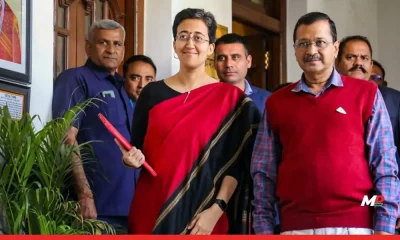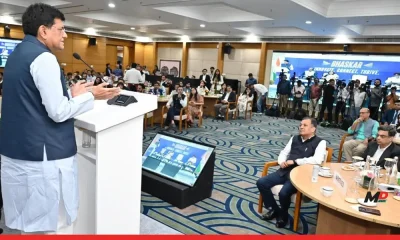Business
Industry leaders react to the Union Budget 2024-25

With Finance Minister Nirmala Sitharaman having presented the 2024 Union Budget, there was a lot to take in for industry onlookers. Now, with a slew of pronouncements made and measures promised, we round up perspectives from diverse industry leaders as they react the to the Budget.

Vineeta Singh, Co-founder and CEO, SUGAR Cosmetics
“VCs and the startup community were eagerly anticipating this incredible announcement given the current funding climate. The removal of angel tax will encourage more investors to take bets on early-stage entrepreneurs and startups. This will enhance sector advancements and create potential career opportunities. On a global platform, this positions India as a go-to business hub for innovations.”
Mayank Kumar, Co-founder & MD, upGrad

“Budget 2024-25 allocations towards skilling and employment and Startup growth marks a watershed moment in India’s journey towards becoming the world’s largest talent economy. With a very strong emphasis on skilling and employment and bridging the talent-academia gap, GOI’s allocations—to fuel aspirations of 4.1 crore youths, empower women to join the workforce, and provide tax benefits and loans like Skilling loan (upto INR 7.5 lakh) and Education loan (upto INR 10 lakh)—is a masterstroke, set to unlock India’s demographic dividend and drive growth.
This budget is not just a financial plan but a blueprint for a brighter future where India’s youth will thrive and continue to lead global job requirements. Innovative initiatives announced, such as the scheme to boost job creation in the manufacturing sector, incentives for EPFO contributions, and reimbursement for additional employee EPFO contributions, demonstrate the government’s commitment to creating a conducive employment ecosystem.
India’s economic growth, described as a “shining exception,” will propel its focus on innovation and growth with a focus on job creation and skilling. The skilling loan and education loan initiatives will further empower India’s youth to drive growth and innovation. Moreover, the government’s scheme to provide internship opportunities to 1 crore youth in 500 top companies over 5 years will bridge the industry-academia gap and enhance employability, empowering India’s youth with the opportunities they need to bridge the talent supply demand across global jobs.
With such bold commitments towards jobs, skilling, and employment, Budget 2024-25 ignites a talent revolution in India, poised to propel the nation’s youth to global leadership. By abolishing angel tax, the government has given a major fillip to the startup ecosystem, fostering more investments, growth, and innovation in India, and enhancing its capabilities to cater to global demands. Additionally, the reduction of capital gains tax for unlisted equity aligns it with listed equity is another strong move, further boosting investor confidence and liquidity in the startup space.”

Prof. Debashis Chatterjee, Director, IIM Kozhikode
“The Union Budget 2024 has laid out an ambitious roadmap for achieving the Vision 2047 of a developed India. The announcement of a National Research Fund is a welcome step to boost innovation and research, with a special focus on private sector-driven R&D.
The forward-looking vision of creating Growth Hubs for 14 cities, fostering industry collaborations through the internship scheme, and introducing a new centrally sponsored scheme on skilling will significantly empower the youth and lay a strong foundation for a resurgent India.
The increased spending on the education sector was much needed, and the current budget has responded positively. The higher education sector will now be more inclusive with the introduction of e-voucher loans at low interest rates, marking a significant step forward in making higher education more affordable.”

Viswanath PS, MD & CEO, Randstad India
“The sharp focus on employment in this year’s budget, particularly through the Employment Linked Incentive Schemes, is a transformative step for job creation in our country. By investing in skilling and bridging the talent demand-supply gap, the budget paves the way for a more robust and future-ready workforce. The provision for internships with top 500 companies, coupled with an internship allowance, will empower our youth with the necessary skills and experience for the ever-evolving job market.
Furthermore, the creation of industrial parks in 100 new cities along with the establishment of dormitories and women’s hostels will ensure that companies have access to the right talent, while also enhancing women’s participation in the workforce. The decision to allow companies to use their CSR funds for training and internships is a commendable move, reinforcing the commitment to fostering a skilled and employable generation.
All in all, there are a lot of positive takeaways for both employers and the talent community from the announcements made in this budget. It is indeed a significant milestone in driving employment-led growth and shaping a prosperous future for India.”

Parimal Heda, Chief Investment Officer, Go Digit General Insurance
“The Union Budget 2024 has maintained its commitment to fiscal prudence yet announced various tax-friendly measures for the Indian taxpayers. From the perspective of the Insurance Sector, amendment made by the government to clarify various activities in insurance sector as neither a supply of goods nor a supply of services is an extremely positive measure for the sector. This will immensely reduce compliance and ongoing litigation burden and provide overall stability to the sector.
Rationalisation of tax deducted at source (TDS) from 5% to 2% for payment of insurance commission to individual agents will ensure additional income in the hands of such individuals for payments made by the insurers. TDS reduction to 2% for payment of bonus or proceeds made on life insurance policies upon maturity will also ensure higher receivables for individual policyholders.
Abolishment of angel tax for all classes of investors will provide a huge fillip to the start-up sector that in the past had witnessed funding winter. This will bring in the much-needed capital, especially from the foreign investors to the growing start-up ecosystem of the country and aid in their future growth.
Floods are one of the most common natural disasters in India. Identifying key states, the government has taken strong steps towards flood mitigation. As systemic risks of floods get mitigated over time through various measures like flood-controlled structures, it will aid insurance companies in underwriting the risks related to liability and property insurance better going forward.
New assessment model for MSME credit and announcement of credit guarantee scheme will also foster better insurance collaboration with lending companies and aid in better assessment of risks.
From an ancillary benefits point of view, the government’s proposal to boost domestic tourism and unlock economic potential of key destinations will have an ancillary impact on travel insurance as well and boost its uptake as bite-sized travel insurance products will likely become part of travellers’ planning.
The government’s aim to prioritise agriculture research and developing climate-resilient varieties of 32 field and horticulture crops will also have an ancillary effect on the crop insurance segment as losses over medium- to long-term will likely reduce from loss of crop due to climate-related incidents.
The Finance Minister’s financial sector vision and strategy document will also be another keenly watched policy by the BFSI sector to garner better insights on the agenda planned by the government for the remaining decade.”
Arundhati Bhattacharya Chairperson & CEO, Salesforce India

“The Budget 2024-25 presented was a balanced one, with a distinct focus on women, youth and job creation, emphasising the sustained efforts to generate ample opportunities for all. As the honourable Finance Minister mentioned, India’s economic growth continues to be the shining exception despite global uncertainties and will remain so in years ahead. Initiatives towards skilling, boosting the participation of women in the workforce, driving the use of technology in agriculture and supporting SMEs that are the greatest employment generators are particularly notable. These measures provide the much-needed fuel to drive India’s economic growth.
The provision of Rs 1.48 lakh crore this year made for education, employment, and skilling is commendable. In addition, employment-linked skills are expected to benefit 2.1 lakh youths, particularly first-time job seekers. The proposed revision of the Model Skill Loan Scheme is also expected to help 25,000 students every year. Enhancing the Mudra loan amount to ₹ 20 lakh is a step in the right direction. Developing a new credit assessment model, based on the scoring of digital footprints of MSMEs in the economy is expected to be a significant improvement over the traditional assessment of credit eligibility based only on asset or turnover criteria and will help cover MSMEs without a formal accounting system to access the same and drive true financial inclusion. It is also encouraging to note the intent to drive participation of women in the workforce. This has been backed up by provisions to set up hostels, establishing creches creating partnerships to organize women-specific skilling programs. A focus on geriatric care would have helped create more well-rounded benefits as women often need to drop out of the workforce in the absence of any infrastructural support for the same.
The depth of talent in India is well-recognised. To capitalise on this, incentives encouraging ease of doing business while exploring ways in which IT can be used for further formal job creation, such as improving citizen services, will address the needs of our large population resulting in improving standards of living and ensuring better targeting of subsidies.
The Budget has also taken steps to ease access to educational loans. Students will benefit from the e-vouchers for loans up to Rs. 10 lakh for higher education in domestic institutions. The new centrally sponsored scheme for 20 lakh youth to be skilled over 5 years is a welcome move. The proposal to upgrade around 1,000 industrial training institutes with hub and spoke arrangement will help elevate the quality and relevance of the courses and ensure that they meet industry standards. The course content is expected to be tailored to the needs of the industry, particularly emerging sectors. Stronger industry-academia partnerships will encourage wider and impactful reach.
The proposal to harness Digital Public Infrastructure to improve agricultural practices sets a great precedent for the digitisation of traditional sectors of our economy. Farmers can benefit from using data effectively for better credit risk assessment, soil analysis, and market conditions. It is hoped that more sustainable and scientifically advanced farming techniques would also find more takers through this route. One hopes the focus on technology adoption extends to other key sectors of the economy as a way to drastically enhance productivity and efficiency, besides spurring new and innovative business models.
The technology industry as well as the workforce will benefit from measures to simplify the tax regime and delays in payments of TDS up to their filing due date. The abolition of the Angel Tax for all classes of investors will also bolster the Indian startup ecosystem. Similarly, the Government’s endeavour to launch internship opportunities in 500 companies, extending to one crore youth over five years, will provide these interns with valuable exposure to real-life environments. The move to allow 10% of training costs to be allocated from CSR funds will help make this initiative viable for companies and students alike.
India has proven itself as a global hub for technology talent and emerged as a preferred destination for global capacity centres (GCCs). Taking steps to smoothen the path and also ensure ease of doing business will drive innovation from India.
Overall, the budget is a step in the right direction particularly driving job creation which is the need of the hour.”
Pradeep Bakshi, MD & CEO, Voltas Limited

“The Union Budget 2024 reflects a forward-thinking approach that will significantly benefit the consumer durables industry and bolster our efforts towards sustainable development. The full exemption of customs duties on 25 critical minerals, including lithium, copper, cobalt, and rare earth elements, is a substantial boost for sectors reliant on these materials, such as high-tech electronics and renewable energy. This policy will not only enhance the availability of these essential resources but also stimulate domestic processing and refining capacities, driving innovation and reducing costs.
Furthermore, the emphasis on energy transition, including the expansion of exempted capital goods for solar panel manufacturing, aligns well with Voltas’ commitment to sustainability. While the non-extension of exemptions for certain solar components reflects a move towards encouraging domestic manufacturing, it also underscores the need for continued investment in domestic production capabilities.
The budget’s focus on substantial investment in manufacturing, presents a promising outlook for the industry. Voltas is optimistic about the positive impact of these policies on the electronics sector and looks forward to contributing to these ambitious goals.”
Sanjay Agrawal, Head Presales and CTO at Hitachi Vantara India and SAARC, and Chair of SNIA

“The government’s focus and plans to foster a robust manufacturing ecosystem in India is reflected in the interim budget presented. The budget’s emphasis on digital infrastructure, skilling, and industrial parks aligns perfectly with our strategy of a digitally transformed and globally competitive manufacturing sector. We are committed to supporting India’s industrial growth journey by providing cutting-edge solutions that enhance operational efficiency, data-driven decision-making, and supply chain resilience. Hitachi Vantara’s expertise in IT infrastructure, data management, and industrial automation is uniquely positioned to help manufacturers capitalize on these opportunities and contribute to India’s economic prosperity.”
Kumar Rajagopalan, CEO, Retailers Association of India (RAI)

“The government has tried to strike a balance between populist and policy measures. RAI appreciates the government’s focus on empowering the middle class and rural population. Initiatives such as monetary support for farmers, higher exemption limits in personal income tax, and increased standard deductions will provide higher disposable income, leading to increased spending.
We believe this will stimulate consumption growth, thereby boosting the overall economy. The reduction of duty on gold, precious metals, and mobile phones will also provide a significant boost to these sectors, particularly during the festive season .
The government’s commitment to skilling and employment support, including initiatives for youth employment and skilling programs, is another commendable aspect of the budget, ensuring a future-ready workforce in the retail sector.
The budget’s emphasis on MSMEs and startups, including enabling more lending and abolishing angel tax, is a positive step towards realizing their potential. Tax simplification and compliance, which are crucial needs of the hour, have also been addressed. Additionally, the Employment Linked Incentive, offering reimbursement to employers up to ₹3,000 per month for two years towards their EPFO contribution for each additional employee, is a welcome move. The establishment of working women’s hostels and creches in collaboration with the industry is an essential measure for supporting women working in the retail sector. The focus on developing infrastructure for shopping in urban development is a significant step forward.”
Costin Mandrea, CEO, SLMG Beverages

“Finance Minister Nirmala Sitharaman’s announcement in the Union Budget 2024-25 to allocate Rs 1.48 crore for education, employment, and skill development in the country which will drive economic growth, social progress, and sustainable development by fostering knowledge, productivity, and adaptability in a country’s workforce.
The government will focus on employment, skilling, MSMEs, and the middle class to bring them into the mainstream. The government is incentivising job creation in the manufacturing sector which will benefit 30 lakh youth. We expect that these additional skilled workers with disposable income in hand will help drive growth in the retail and consumer segment The budget successfully engineered a fine balance between supporting job creation and skilling, rural development, and agriculture along with continued focus on infrastructure spending without compromising on fiscal consolidation.”
Rahul Mehta, Chief Mentor, Clothing Manufacturers Association of India (CMAI)

“This budget is extremely pragmatic and innovative in some of the bold decisions and directions it has taken to encourage employment directly. The steps include an internship scheme, the decision to reimburse one month’s wages for new employees, and subsidies for employees earning over a lakh of rupees. These are excellent steps being taken. However, there are many open-ended areas at this point, and we await the details before making specific suggestions.
Nonetheless, this is a visionary, pragmatic, and very innovative budget that the Finance Minister has presented. Whilst most of these measures are for all industries, they will likely benefit the textile and apparel industry equally, if not more since it is more labour-oriented. Therefore, we are confident it will benefit the apparel industry. Furthermore, additional measures announced to support bank credits to MSME’s and easing of foreign investment will also benefit textile and apparel industry. The import relaxation in some of the important raw materials, trims and accessories required for garment manufactures will also help the garment manufacturers to be more competitive, especially in the Export markets.”
Sanjay Vyas, Executive Vice President and Managing Director, Parexel

“The healthcare sector has received a significant boost, with an allocation of ₹89,287 crore, marking a substantial increase from ₹79,221 crore in FY 2023-2024. The Union Budget also increased allocation for R&D, particularly through the Anusandhan National Research Fund, a welcome step for the clinical research industry. This aligns with the sector’s growing emphasis on innovation. Furthermore, the government’s push for digital infrastructure under the Jan Vishwas Bill will significantly enhance the operational efficiency of clinical trials. Moreover, the budget’s emphasis on skill development and women’s empowerment will contribute to a robust talent pipeline for the life sciences sector. These measures collectively position India as a more attractive destination for Global Capability Centers (GCCs).”

Mayuresh Raut, Managing Partner, Seafund
“This was an albatross that hindered much needed capital to be deployed to deserving founders. Removal of this dreaded tax will give a huge fillip to startups in the country and free up investors to focus on the investments without having anxiety on how to deal with their implications. A few other things that work well for deep tech focused funds like us. The rooftop solar policy, the pumped storage policy and research and development for small & modular nuclear reactors, Bharat small reactors, R&D for small modular reactors, R&D for new technology in nuclear form a neat troika to alter the energy map of India. Specially on the nuclear side, it positions India to replicate the renaissance that nuclear is experiencing in the US.”

Bhaskar Majumdar, Managing Partner, Unicorn India Ventures
“This is recognition of the growing need for a deeptech economy. However, alongside the R&D Fund, the government should look at the Intellectual Property regime. The much overdue Patent Policy needs to come out soonest to enable maximisation of R&D Fund.”

Manoj Agarwal, Managing Partner, Seafund
“As a deep tech focused VC fund, FM announcing Rs 1000 crore space economy VC fund and R&D fund of Rs 1 lakh crore will work as a strong catalyst for startups in deeptech and space tech. This Budget has given attention to several demands of the industry which have been long standing. Rationalising of LTCG to 12.5% for all financial and non financial assets is also a step to bring parity between listed and unlisted companies.
However, the biggest take away from the Budget is removal of angel tax. This will lead to ease in raising funding for early stage founders and will encourage more early stage investors and angels to look at startup investing as a fruitful asset class. In our view, this single announcement is a small step in the direction of making angel investment accessible for people with investment corpus which currently goes to markets and Mutual Funds.”

Ketan Mehta, CFO of CredAble
“We are delighted to see that the Union Budget 2024–25 has addressed many critical facets of the economy. This year, the budget has truly put the spotlight on key issues facing the MSME sector in securing timely credit and has ushered in a plethora of opportunities for young entrepreneurs.
The government has proposed a new scheme under the Credit Guarantee schemes for MSMEs in manufacturing, providing MSMEs with collateral-free term loans for buying machinery and equipment. To further strengthen the financial stability of MSMEs, the limit for Mudra loans has been increased from INR 10 lakh to INR 20 lakh. Additionally, E-commerce export hubs will be set up to boost international trade. The government’s strategic move to provide internships and new schemes for the country’s youth, with a central outlay of INR 2 lakh crore, sums up its futuristic outlook.
The Union Budget has been extremely positive in recognising the role being played by MSMEs in India’s present and future. It’s also encouraging to see the government’s move to incentivise existing businesses and abolish the angel tax for all classes of investors, which will further aid the acceleration and globalisation of the startup ecosystem in the country.”














